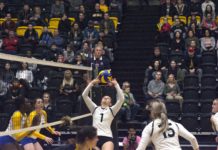Professors Barry Kay, Robert J. Williams, and Anna Esselment composed a panel that discussed a wide range of issues including vote-splitting, electoral reform, youth voter disengagement, which party leader has more to lose, what leaders have to do to appeal to voters in tonight’s televised debate, and the 30 per cent tuition rebate and how it should mobilize the student vote.
Feds and the Political Science Student Association (PSSA) hosted the discussion panel in the SLC. The crowd was sparse but the discussion was energetic and interactive.
When asked what was at stake for the individual party leaders, Esselment, said, “Kathleen Wynne has most to lose.” She added that Wynne is in a position of power as premier and possibly losing her position could be devastating to her status as leader.
Kay, however, said Tim Hudak has the most to lose from this election outcome. He said that if Hudak fails during this election, this would be the second time in a row he loses an election he really could have won, “if he would have kept his mouth shut.”
“Hudak is most likely to lose his leadership status if he falters,” Kay said. “He’s too honest … there is a word for honest politicians, it starts with an L… losers.”
Williams agreed citing that not many governments survive as many scandals as the Liberals have over the years.
However, Williams added, “Voters are tired of Hudak’s negativity.” And noted, “the word corruption is pretty loaded.”
Esselment also said that Andrea Horwath’s shift to the centre, to appeal to Liberal voters, might cost her the leadership if the NDP lose a significant number of seats.
Kay agreed, but pointed out that “no reasonable NDP party member realistically expects to win the most seats, let alone achieve a majority government.” Therefore, Kay said he expects similar results for the NDP as the previous general election.
The conversation then turned to the issue of vote splitting, youth disengagement, and how the issue of the 30 per cent off tuition grant should mobilize the youth and student cohort.
“If people are concerned with defeating Hudak they should look to the voting history of a particular riding to avoid vote-splitting,” Kay said. He cited the riding of Kitchener-Waterloo, where he claims it is in the best interest of Liberal voters to vote for NDP candidate Catherine Fife in order to prevent the PCs from possibly winning the seat.
He added that the PCs would stand to gain if the NDP manage to capture a larger faction of the centre-left.
Williams agreed, and admitted that he personally, much like Kay, would not vote for Tim Hudak’s PCs in the upcoming election.
In response to a question from the audience regarding the reasons for youth disengagement in the political process and what type of impact the student vote can have in this election, Williams said, “Post-secondary students can be enormously influential.”
“The issue of the tuition rebate should mobilize people,” Kay said. “It’s tragic if it doesn’t.”
When asked why political parties and leaders don’t provide much for students in their platforms, Esselment said, “The cyclical process of students not turning out is why young people don’t get as much attention.”
She added that politics have become less about citizenship, duty, and long-term vision, and more about “what can you offer me?” and “what benefits me most?”
“Politics have become like a consumer market place, what are you offering me? How do I gain from this?” Esselment said.
Hours before the all-leaders televised debate, Esselment said Ontarians are looking to see “who has a vision that is able to speak to them, who is authentic, who’s down to earth and who’s thinking about their children and the future of Ontario?”
Esselment emphasized that whoever emerges as the best “economic manager” in Ontario, could emerge as the best option for Premier.
Esselment said each party leader has some work to do: “Hudak will need to fix his arithmetic … Horwath will need to develop some more policy depth… she [Wynne] has to show she’s different from McGuinty.”
Kay said debates don’t matter. He argued that debates are much like sports; the people that watch are already decided.




























